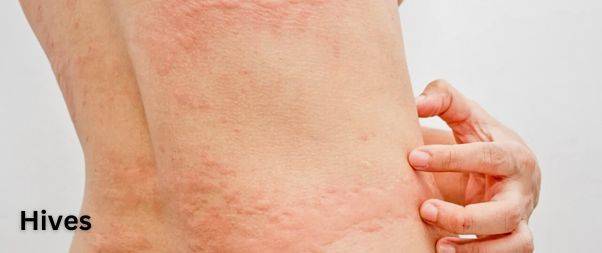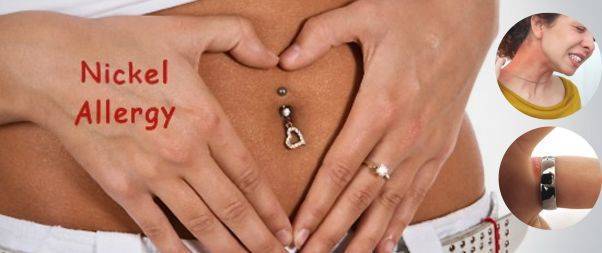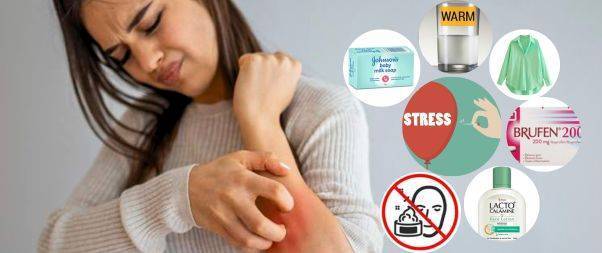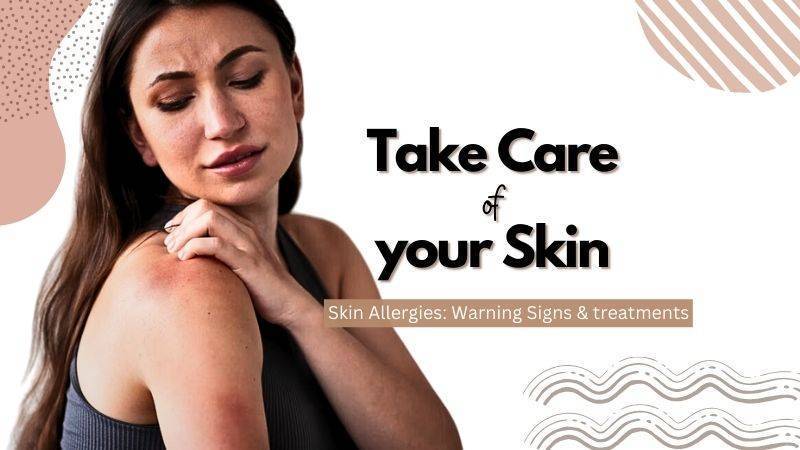Highlights
Skin allergies impact millions of people worldwide. They occur when the immune system overreacts to a usually harmless substance, called an allergen.
In this blog, we will discuss the various types of skin allergies, their symptoms, causes, and some of the most effective treatment options.
Types of Skin Allergies

- Contact dermatitis: This is the most common type of skin allergy, resulting from direct contact with an allergen. It is usually characterized by red, itchy, and inflamed skin. Common causes include:
- dyes in clothes
- beauty products
- poisonous plants, such as poison ivy and sumac
- synthetic compounds, like plastic or rubber
- Atopic dermatitis (Eczema): A chronic skin condition that causes patches of dry, itchy, and inflamed skin. It often develops in early childhood and may be triggered by a combination of genetic and environmental factors.

- Urticaria (hives): Raised, itchy, red welts that appear suddenly on the skin, often as a result of an allergic reaction. Hives can last anywhere from a few hours to several days.

Warning Signs
A skin allergy manifests as irritated, inflamed, or blistered skin. The accompanying symptoms can include itchiness, the appearance of elevated bumps, reddening, or a mix of these conditions.
Some common symptoms of skin allergies include:
- Redness and inflammation
- Itching
- Swelling
- Blisters or welts
- Dry, cracked, or scaly skin
- Burning or stinging sensation
Causes
Skin allergies can be triggered by a variety of factors.
Identifying the exact cause of a skin allergy can be challenging, as there are over 3,700 potential allergens. Some of the most common culprits include:
Nickel:

This metal, found in jewelry, belt buckles, zippers, and bra hooks, is the leading cause of contact dermatitis.
Tip: Familiarize yourself with ways to avoid nickel exposure.
Fragrances:

Perfumes, lotions, and other products with added scents can frequently trigger skin allergies.
Household items and everyday products:

Certain preservatives and metals in common household products may irritate your skin. These can include:
- Cleaners
- Sunscreens
- Cosmetics
- Hair dyes
- Antiperspirants
Antibiotic-containing skin creams:
Some over-the-counter options, such as bacitracin and neomycin, can cause skin allergies.
Latex:

This natural rubber is used in various products, including:
- Condoms
- Balloons
- Disposable gloves
- Baby bottles
Other Factors may include:
- Environmental allergens (e.g., pollen, pet dander, dust mites)
- Foods (e.g., nuts, shellfish, dairy products)
- Insect bites or stings (e.g., mosquitoes, bees)
- Medications (e.g., antibiotics, nonsteroidal anti-inflammatory drugs)
Treatments:

Treatment options for skin allergies depend on the severity of the condition, the type of allergy, and the individual’s overall health. Some common treatments include:
Topical treatments:
- Over-the-counter creams and ointments (e.g., hydrocortisone cream)
- Prescription-strength corticosteroids
- Calcineurin inhibitors (e.g., tacrolimus, pimecrolimus)
- Barrier repair creams
Oral medications:
- Antihistamines (e.g., cetirizine, loratadine, fexofenadine)
- Corticosteroids (e.g., prednisone)
- Immunosuppressants (e.g., cyclosporine, methotrexate)
Phototherapy:
- Controlled exposure to ultraviolet (UV) light, which can help reduce inflammation and itchiness in the skin
Allergy shots (Immunotherapy):
- A long-term treatment that gradually exposes the immune system to small amounts of an allergen, helping to build up a tolerance
Lifestyle changes:
- Identifying and avoiding triggers
- Maintaining a regular skincare routine with gentle, fragrance-free products
- Using hypoallergenic laundry detergents
- Wearing loose, breathable clothing
- Managing stress
Precautions

Skin rashes can vary in appearance and arise from numerous causes. Nevertheless, some fundamental steps can expedite recovery and alleviate discomfort:
- Opt for mild, baby, or sensitive skin soap, avoiding scented varieties.
- Use warm water for washing, rather than hot water.
- Wear loose-fitting cotton clothing.
- Consult a doctor or pharmacist about appropriate moisturizers and emollients.
- Refrain from covering rashes with bandages or Band-Aids.
- Gently pat the rash dry, avoiding rubbing.
- Apply unscented moisturizers to dry rashes, such as those caused by eczema.
- Discontinue using cosmetics or lotions that may be contributing to the rash, particularly newly acquired items.
- Resist the urge to scratch, as it heightens the risk of infection.
- Inquire about over-the-counter cortisone creams from a pharmacist to alleviate itching.
- Calamine lotion can soothe certain rashes, like poison ivy, chickenpox, and poison oak.
- Manage stress to help reduce symptoms of rashes stemming from chronic conditions like psoriasis.
- For painful rashes, consider acetaminophen or ibuprofen. While these may help manage symptoms, they won’t address the underlying cause of the rash.
Always consult a healthcare professional before taking any medication. When purchasing over-the-counter or online products, compare brands to ensure you select the most suitable option.
In a Nutshell
Skin allergies can be uncomfortable and disruptive, but with the right knowledge and treatment plan, they can be effectively managed.
If you suspect you have a skin allergy, consult a doctor for a proper diagnosis and tailored treatment plan.
Implementing lifestyle changes, using appropriate medications, and avoiding known triggers can significantly improve your quality of life.
Also Read






